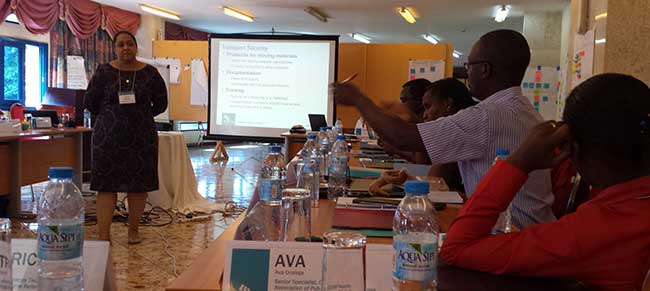
APHL Public Health Preparedness & Response Director Chris Mangal fields a question on Biosecurity at an Emerging Leaders Program workshop in Entebbe, Uganda
Uganda—a landlocked East African nation of 38 million, roughly the size of Michigan—stands out on the African continent as one of few countries with a relatively high-functioning, national public health laboratory system. Uganda, for example, is one of only a small handful of African countries able to test for the Ebola virus. Yet, as in the United States, assuring the availability of future laboratory leaders with both scientific and management expertise is a challenge here. It is also the focus of a new collaboration among APHL, the Uganda Ministry of Health and CDC Uganda, which are working together to implement APHL’s Emerging Leader Program (ELP) in-country, for a cadre of 15 of Uganda’s high-potential, mid-level, laboratory scientist-managers (selected from a national applicant pool of 58).
The nine-month program is designed to support both personal and professional development and supports the Global Health Security Agenda (GHSA), a two-year-old, international effort to reduce infectious disease threats worldwide.
ELP Uganda kicked off with a four-day, onsite meeting in April to introduce leadership fundamentals and to discuss work styles, GHSA priorities, strategic planning to meet national health goals and the utility of laboratory networks and emergency operations plans. Additional onsite workshops will be held in June and October 2016 and will cover, among other things, media and risk communication, change management, conflict resolution and presentation fundamentals. In addition, the 15 participants will take part in a peer coaching program with US ELP alumni and will collaborate on three projects to advance Uganda’s national laboratory system. Those projects, all aligned with GHSA, Ministry of Health and CDC priorities, are:
- Improving the External Quality Assessment Program.
- Implementing and evaluating internal laboratory quality control procedures to assure the accuracy of test results.
- Developing recommendations to strengthen the national laboratory referral system through which patient specimens are routed to laboratories with appropriate testing capabilities.
Projects will culminate with formal presentations to high-level Ministry of Health officials in late 2016.
In a country in which the life expectancy at birth is just 57 years for males and 61 for females (compared with 76 and 81 in the US, respectively), a strong national laboratory system—with well-trained leaders—is crucial to detect and contain illnesses like HIV, TB, malaria and other endemic infectious diseases. In addition, Uganda’s national laboratory system is a much-needed resource for other African nations striving to meet GHSA goals.
ELP Uganda faculty include Pandora Ray, director of APHL’s National Center for Public Health Laboratory Leadership; Chris Mangal, director of APHL’s Public Health Preparedness and Response Program; Kajari Shah, manager of APHL’s Emerging Leader Program; Ava Onalaja, a senior specialist with APHL’s Global Health Program; and Kim Lewis, a senior consultant with APHL’s Global Health Program.